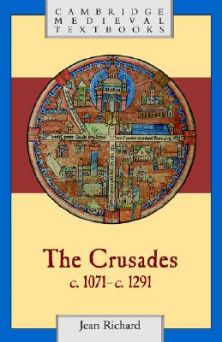
The Crusades c. 1071 - c. 1291
Jean Richard
Jean Birrell
516 pages including index
published in 1999
The Crusades are not my favourite subject in Medieval history, as I tend to concentrate my reading on the early Middle Ages, but The Crusades c. 1071 - c. 1291 is part of the Cambridge Medieval Textbooks series which I have good experiences with. The volumes in this series I've read so far all have been good introductions to their subjects. Of course, much still depends on the writer and I didn't know Jean Richard, but he turns out to be a French historian who is well known enough to have an entry on the English language Wikipedia; this book was first published as Histoire des Croisades. The translation is by Jean Birrell and is good enough that you don't really notice it is a translation.
Because of the American shenanigans in the Middle East in the past decade, the Crusades have been used quite a lot as a metaphor for these adventures, as well as an example for internet jihadists and Keyboard Kommandos both of the War Between Christianity and Islam as an universal war. The crusaders themselves feature as either the heroic defenders of the free west or bloodthirsty invaders of the peaceloving Islamic world. Reading a history like this is the best anecdote to that sort of nonsense. Jean Richard is careful to show that the motivations on both sides were slightly more complex than "Christ v Allah". Religion obviously played a key role in the Crusades and there were certainly fanatics on both sides, but the realities of the Crusades and life in the Holy Land were more complex than the Crusading myths make out. What Richards contineously emphasises is that the key motivation for the Crusades was not the idea of forcibly converting heathens to Christianity, but rather of safe guarding the Holy land for Christianity, making it safe for pelgrims to visit, keeping the holy places safe for Christian worship.
Fortunately for an already exhaustive history, Richards limits his focus to the Crusades to Palestinia/the Middle East and doesn't take into account other crusades elsewhere, against heretics in already Christian countries in Europe, or the German campaigns against heathens at the Eastern borders of Christendom. These were different enough from the "real" crusades that it would've made this book incoherent. It's complicated enough already as it is. The Crusades is a largely traditional chronological history, starting from just before the First Crusade to the end of Frankish rule in the Holy Land, some two centuries full of kings called Baldwin. His point of view lies largely with the crusaders and the Frankish lands, their Muslim opponents only discussed in the context of their dealings with the Franks.
Even with this omission Richards is basically writing two histories at once: that of the Crusades proper and that of the Frankish or Crusader states, founded after the success of the First Crusade and which managed to survive in increasingly hostile conditions for some twohundred years. Either of these is complex enough on its own already, treating them together does make for some difficult reading at times. That Richards manages to make a clear and concise narrative from these complex histories is quite an achievement, even if sometimes the flood of rulers with the same names becomes a bit too much.
The question of why the Crusades started when they did and what the motivations were of the crusaders is a complicated one as Richard shows. It had been some centuries since Islam had overrun the Holy Land after all, but while Christians living there and pilgrims visiting it had to endure some humiliations, there wasn't a real proximate cause for the Crusades, other than the pressure the Byzantine Empire was under pressure from the Turks. Yet while the Pope might have called for a Crusade to relief that pressure (and also reforge ties with Eastern Christians), what it turned into was the liberation of Palestine and the establishments of several Christian kingdoms there.
These Frankish states had to survive amidst their Islamic neighbours, but this didn't mean they existed in a state of perpetual war, let alone Holy War. Instead for long stretches of time between crusades, the region was dominated by the same sort of power politics as any other region with various weaker and stronger powers, as states fought each other, became allies, traded or became vassals of stronger countries. For both Christian and Muslim rulers, realpolitics usually trumped religious convictions. It's when they didn't, when there was a Saladin determined to destroy the Frankish states that the Crusades resumed.
These Crusades were never succesful in the sense that they defeated the Muslim powers in the region for ever, but they did guarantee the continuing survival of the Frankish states for roughly two centuries. Each time these kingdoms were truly threatened, the arrival of crusaders from the west was able to restore the balance. It was only when the broader political situation in the Middle East had changed, with first the arrival of the Mongols and then the creation of the Mamluk dynasty in Egypt, combined with a loss of interest in the region in the west as other concerns preoccupied European powers, that the Frankish kingdoms were overrun.
The Crusades c. 1071 - c. 1291 is an excellent overview of this history, but was sometimes a bit of a slog to get through, due to the repetive nature of some of this history.
Webpage created 12-12-2011, last updated 17-12-2011.